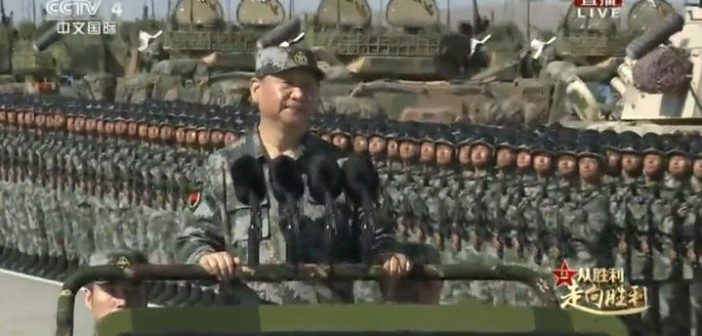Failure to Halt Beijing in Hong Kong Will Only Empower It
The recent deadly skirmish between China and India in a disputed border area has fueled a necessary debate over how best to respond to an increasingly belligerent Beijing.
The incident comes as Beijing increasingly aggressively bullies its neighbors and anyone that criticizes it; intellectual property theft and disregard for international agreements; further militarizing artificial islands on contested territory to control the South and East China Seas; and smothering Hong Kong’s democracy movement.
Beijing is also stealing coronavirus-related research, wants to be first with a cure hoping to reshape a new order with itself at its center.
It’s now clear China is the bully critics long warned it was. And as with all bullies, each success empowers ever more provocative actions unless it’s stopped.
Sadly, history shows authoritarian states, obsessed with visions of destiny and confident of their economic, diplomatic and military power miscalculate badly by over reaching, igniting wars lead to their downfall.
Now that China has transitioned from intimidating neighbors to killing soldiers from its giant nuclear-armed neighbor, albeit in a medieval way, Beijing is messaging it’s comfort with ever bolder action. It is convinced it’s time has come and a coronavirus-distracted world lacking American leadership will yield rather than pay the economic and military costs of pushing back.
As the only pressure that moves Beijing is when the world unites against it, it’s imperative the international community quickly organize to compel Chinese leaders to change course before they do something we all will regret.
The weakness of the international community has brought us here.
For too long, Washington and its allies sought dialogue and weak piecemeal responses rather than consistently hold bad behavior to account, convinced China would become more democratic and responsible as it grew richer and more powerful.
So far, China has sought to win without fighting through thievery, as well as military and economic intimidation.
But Xi Jinping was granted a life term to stand up to America, crack down on Hong Kong and take back Taiwan.
If Xi stifles Hong Kong’s autonomy without repercussion, he’ll move on Taiwan where he’s already trying to provoke Taipei.
The National Security Law would smash the democracy movement that through the ballot box secured a majority of legislative council seats, a right enshrined for many more years under the agreement that transferred Hong Kong from UK colony to China in 1997.
As for Taiwan, Beijing eventually wants to create a justification to attack the island and force Taipei’s surrender in 24 to 48 hours before anyone can react. Powerful Chinese capabilities would slow a US-led response, hoping Washington will conclude dislodging its well-ensconced PLA forces would be too costly.
In a stroke, China would take Taiwan and tarnish America’s global power, accelerating the decline of the rules-based order it seeks to replace.
Xi is also eager to stage incidents to blood his forces, which haven’t seen action since 1985.
We are where we are because economic interests prevailed over principle as China grew steadily more nefarious.
Companies, universities, lobbyists and China’s apologists profited as consumers benefited from cheaper goods. Nations courted Beijing to do big things, like control climate change. China happily exploited the ecosystem to afford new capabilities to become a superpower able to rewrite rules to its liking.
Despite tough public talk, President Trump’s privately begged Xi for trade deal please his base and for help to remain in office. It’s unclear whether Trump will get tougher after former national security adviser John Bolton’s revelations.
If Joe Biden wins in November he must be tougher on China as president than when he was as vice president.
Trump handed China a golden opportunity by consistently undermining international organizations and key alliances. Thankfully, Beijing has overplayed its hand.
Driving Beijing to a new course means identifying every Chinese weakness and a willingness to exert necessary pressure.
Beijing faces a dire economy worsened by the pandemic, endemic corruption and the often incompetent and insensitive leadership of an authoritarian state.
Its actions suggest insecurity over internal weaknesses, pushing leaders toward external shows of strength for domestic consumption.
Changing this increasingly dangerous dynamic will take greater US leadership and alliance cohesion unseen in decades.
First, Washington and its friends must make clear any Chinese move against an allied state, especially Taiwan, would be tantamount to a declaration of war on the United States and its allies through mechanisms like NATO’s Article V. This is critical for a nation that believes it can operate with impunity.
It is equally vital to stress the will to act militarily. Allies are watching Washington as a failure to defend an ally in Asia will undermine alliances everywhere.
Reminding a reckless adversary that war is an option isn’t destabilizing, but vital for diplomacy and deterrence.
Second, America must finally lead to quickly organize like-minded nations fed up with China’s increasingly unbounded behavior.
Washington must stop dividing allies, drop trade wars and petty feuds and align them into a unified diplomatic and economic coalition that is resolute without being unduly provocative.
The coalition must apply so much pressure on Beijing so quickly Chinese leaders pay attention.
Organizing America, Europe and leading Asian nations and quickly crafting powerful sticks and highly attractive carrots to change Beijing’s vector will be hard work given its giant economy, formidable military and a first-rate technological capabilities.
But America and Europe together have double China’s economic might and with Australia, Japan, South Korea and India, the coalition would be formidable economically, diplomatically and militarily, a like to exert tremendous leverage. (Ideally, Russia would be part of the coalition as well, but only after Moscow is also compelled to change its equally bellicose stance toward NATO and the EU, active undermining of democracies and withdraw from Ukraine.)
To reduce vulnerabilities Beijing has exploited, key supply chains can be repatriated and new sources of raw materials found.
Declaring Beijing a currency manipulator, imposing Magnitsky sanctions, blocking technology transfers and business deals, and seizing foreign investments and property are other options.
Cutting Chinese students and tourists off from traveling to and studying in nations that China threatens may also be necessary.
Third, economic threats against one ally must be regarded as a threat against all. After Beijing froze Australian beef imports to punish Canberra for seeking for an investigation into the coronavirus outbreak, Australia’s allies must help buy what China blocked.
Fourth, allies must invest more on capabilities to counter China’s military capabilities and remain globally competitive, including on artificial intelligence, 5 and 6G communications, quantum computing, new nano and bio technologies, autonomous and long-range strike systems, and clean energy.
Finally, democracies must resume evangelizing about democracy, equality, transparency and the rule of law that defines them to counter China’s pro-authoritarianism narrative.
Under Xi, China is more ideological, nationalistic and dangerous, using Western technology to impose order at home and make money aboard.
China is not invincible, but hoping it will fail on its own is no strategy. Indeed, authoritarian states become more dangerous as they weaken.
Those advocating for “collapsing” the CCP must reconsider. An insecure, megalomaniacal organization leading the world’s No. 2 economic, military and technological power with a growing nuclear arsenal must be treated very carefully. Ham-fisted strategy that corners China and its leaders will end badly.
That’s no rationale for inaction.
Fears that any pushback will give Beijing reason to lash out are equally absurd. Bullies can’t be allowed to play victim when they are called out.
The right course is diplomatic and economic hardball. This will be costly economically, but cheaper than conflict.
The goal is a responsible China that abides by international law and its agreements. Less optimal is a China in a new Cold War. The outcome that must be avoided is bungling into a hot war.
The international community has between months or a few years after which China will have grown so capable and aggressive, changing its course will only become harder. Indeed, at that point, many may decide it’s easier to live by China’s rules.
Changing China’s course will take sustained, deft and nuanced action. Hard choices will be necessary. Success will mean stability and prosperity, but failure will mean living in a very different world.




